2020-2021学年牛津译林版英语八年级下册 Unit 3 Grammar Simple past tense and present perfect tense课件(共33张PPT)
文档属性
| 名称 | 2020-2021学年牛津译林版英语八年级下册 Unit 3 Grammar Simple past tense and present perfect tense课件(共33张PPT) |  | |
| 格式 | ppt | ||
| 文件大小 | 4.0MB | ||
| 资源类型 | 教案 | ||
| 版本资源 | 牛津译林版 | ||
| 科目 | 英语 | ||
| 更新时间 | 2021-03-28 19:55:05 | ||
图片预览

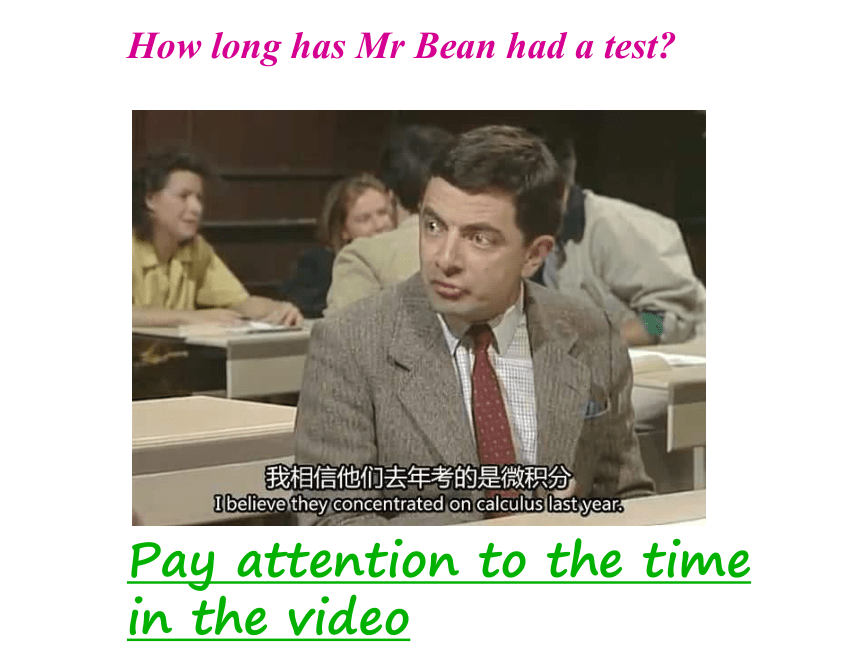


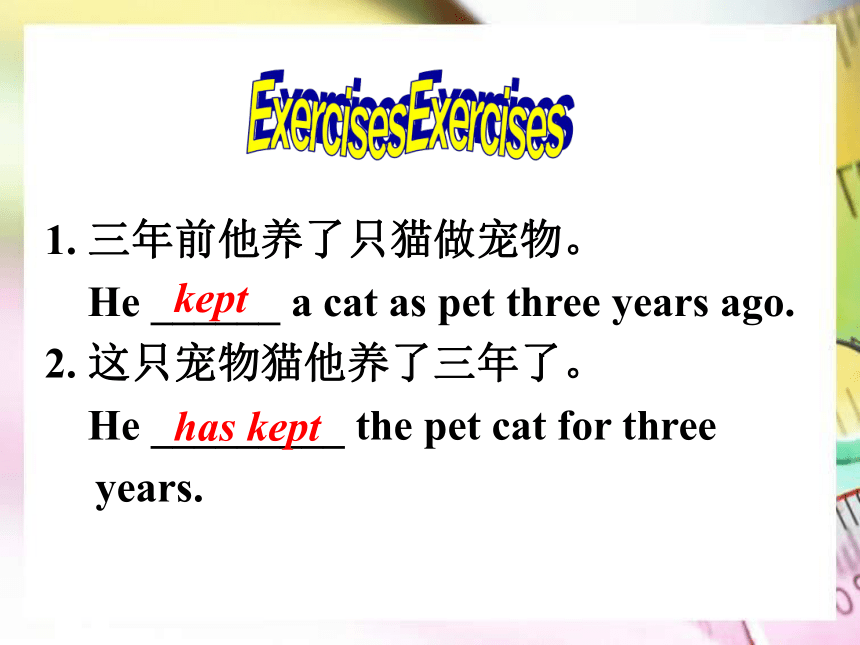

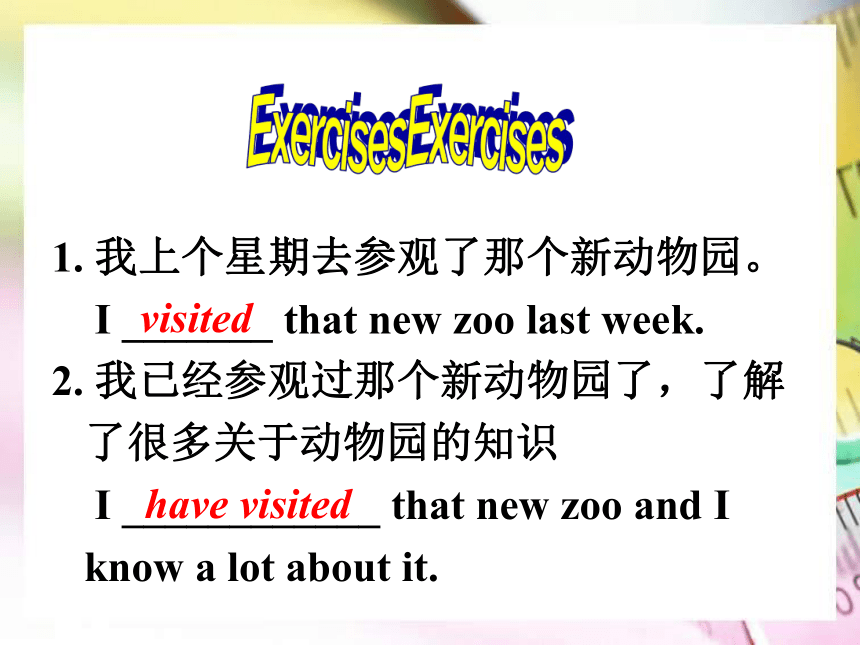
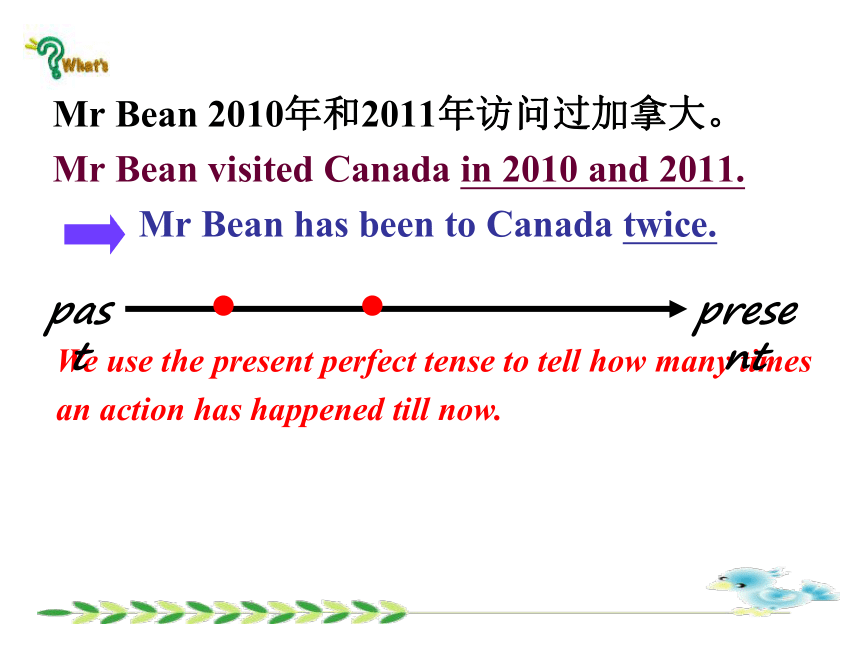



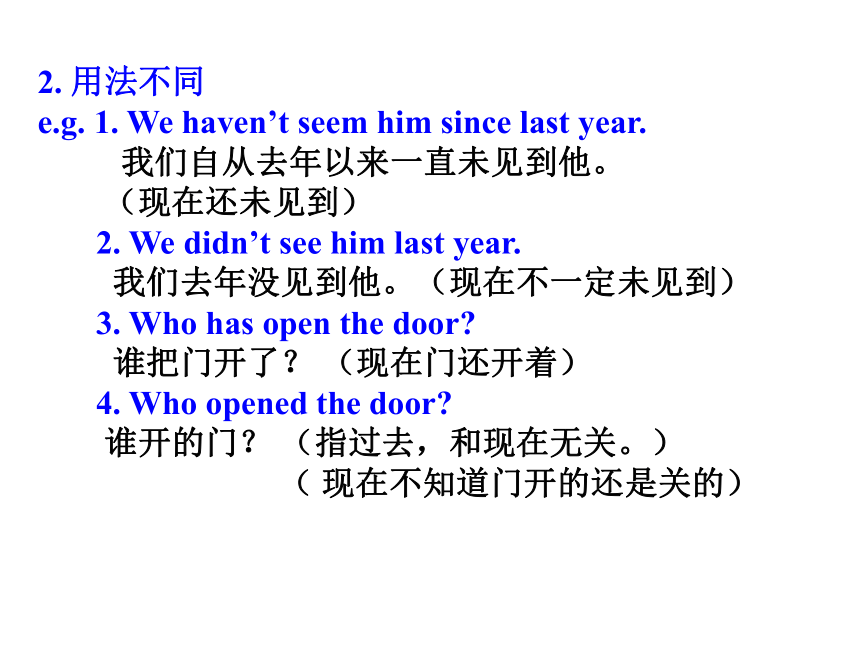
文档简介
(共33张PPT)
Unit3
Grammar
Simple
past
tense
and
present
perfect
tense
How
long
has
Mr
Bean
had
a
test?
Pay
attention
to
the
time
in
the
video
Mr
Bean
How
long
has
Mr
Bean
had
a
test?
He
has
had
a
test
for
about
eight
minutes
since
about
eight
minutes
ago.
About
eight
minutes
ago,
he
began
to
take
a
test.
We
use
simple
past
tense
to
tell
what
happened
in
the
past
只强调过去开始
We
use
the
present
perfect
tense
to
talk
about
an
action
that
started
in
the
past
and
continues
to
the
present.过去开始持续到现在
past
present
past
present
When
did
Mr
Bean
begin
to
have
a
test?
1.
三年前他养了只猫做宠物。
He
______
a
cat
as
pet
three
years
ago.
2.
这只宠物猫他养了三年了。
He
_________
the
pet
cat
for
three
years.
kept
has
kept
Exercises
Mr
Bean已经买了辆新汽车。
Mr
Bean
has
bought
a
new
car.
(Mr
Bean
has
a
new
car
now.)
We
use
the
present
perfect
tense
to
talk
about
the
result
of
an
action.强调过去动作对现在造成的结果和影响
past
present
1.
我上个星期去参观了那个新动物园。
I
_______
that
new
zoo
last
week.
2.
我已经参观过那个新动物园了,了解了很多关于动物园的知识
I
____________
that
new
zoo
and
I
know
a
lot
about
it.
visited
have
visited
Exercises
Mr
Bean
2010年和2011年访问过加拿大。
Mr
Bean
visited
Canada
in
2010
and
2011.
Mr
Bean
has
been
to
Canada
twice.
We
use
the
present
perfect
tense
to
tell
how
many
times
an
action
has
happened
till
now.
past
present
1.
我上周看过这部电影。
I
_____
this
movie
last
week.
2.
我已经看过这部电影很多次。
I
__________
this
movie
many
times.
saw
have
seen
Exercises
Differences:
构成不同
(1)
Mr
Bean
went
to
London
last
year.
(did)
(2)
Mr
Bean
has
been
to
London
twice.
(have/has
done)
一般过去时
谓语动词用动词的过去式。
现在完成时
谓语动词用
“助动词
have/has
+过去分词”
2.
用法不同
(1)
Mr
Bean
had
supper
an
hour
ago.
(表示过去的动作)
(2)Mr
Bean
have
just
had
supper.
(强调对现在的影响———
憨豆先生不饿)
(3)Mr
Bean
was
a
teacher
then.
他那时是个教师。
(表示过去的状态)
(4)Mr
Bean
has
been
a
teacher
since
then.他从那时起一直当教师。(他现在还是教师)
2.
用法不同
e.g.
1.
We
haven’t
seem
him
since
last
year.
我们自从去年以来一直未见到他。
(现在还未见到)
2.
We
didn’t
see
him
last
year.
我们去年没见到他。(现在不一定未见到)
3.
Who
has
open
the
door?
谁把门开了?
(现在门还开着)
4.
Who
opened
the
door?
谁开的门?
(指过去,和现在无关。)
(
现在不知道门开的还是关的)
3.
具体的时间状语
(1)
一般过去时的时间状语
yesterday,
the
other
day,once,
last
week,
….ago,
in
1980,
in
October,
just
now
等。
(2)现在完成时的时间状语
for,
since,
so
far,
ever,
never,
just
,
yet,
(not)till,
recently,up
to
now,
until/till
now
等。
Simple
past
tense
一般过去时
Present
perfect
tense
现在完成时
构成
时间状语
语境
did
have/has
done
yesterday,
in
1980,
last
week,
…ago,
just
now,
the
other
day等
for,
since,
ever,
never,
just,
yet,
recently,
before,次数,in
the
past
years
,
over
the
years
,
so
far等
表示过去某时发生的动作或单纯叙述过去的事情,强调动作.
持续到现在的动作或状态;强调过去的事情对现在的影响;到目前为止,动作发生的次数.
Read
and
remember
make
--
made
--
made
fly
--flew--
flown
go
--
went
--
gone
do
--did
--done
know
--
knew
--
known
get--got
--
got
give--
gave
--
given
buy--bought
--
bought
drive--
drove
–
driven
swim--swam
--
swum
speak--
spoke
--
spoken
write--wrote--written
say--
said
--said
read--
read--read
While
Mr
Bean
was
having
a
test,
he
met
with
some
problems.
Can
you
help
him?
(Part
B
on
P41)
After
the
test,
Mr
Bean
plans
to
relax
himself
by
travelling.
Simon
is
showing
him
some
pictures.
(Part
A
on
P41)
I
______
(visit)
the
Palace
Museum
with
my
grandparents
the
other
day.
I
________
(climb)
Mount
Huang
last
Summer.
visited
climbed
_____
you
ever
_____
(try)
the
famous
Tianjin
Baozi?
I
am
happy
that
I
_____________
(learn)
to
swim.
Have
tried
have
learnt/learned
The
Eiffel
Tower
(visited)
castle
(have
been
to)
Beijing
Duck
(tasted)
Places
of
natural
beauty
(have
enjoyed)
Mr
Bean
isn’t
as
lucky
as
you.
He
has
never
been
to
Nanjing.
So
he
is
asking
Simon
about
the
city.
(Part
C
on
P42)
M:
(you/be/ever)
to
Nanjing?
S:
Yes,
I
(be)
there
three
times.
M:
When
(you/go)
there
last?
S:
Last
summer.
I
(spend)
a
week
there.
M:
(you/like)
it?
S:
Oh
yes.
I
(have)
a
great
time
there.
I
(visit)
many
places
of
interest
and
(eat)
lots
of
local
food.
M:
Lucky
you!
I
(be/never)
there.
Have
you
ever
been
A
talk
about
Nanjing
have
been
did
you
go
spent
Did
you
like
had
visited
ate
have
never
been
Help
him
complete
the
diary.
be
buy
read
return
see
show
Saturday,
15
March
Have
you
ever
dreamt
of
travelling
around
the
world
without
a
passport?
Yes,
you
can
realize
your
dream
by
taking
an
online
tour.
Yesterday
Daniel
(1)_________
me
an
online
tour
of
the
USA.
I
(2)_____
never
_____
so
many
wonderful
pictures
before.
showed
have
seen
passport
n.护照
Last
week,
I
(3)_________
a
book
about
the
places
of
interest
in
the
USA.
I
(4)_________
20
pages
already.
It’s
really
interesting.
My
dad
(5)_____
just
_________
from
the
USA,
but
I
(6)
______
never_______
there.
I
hope
I
can
visit
the
USA
some
day.
be
buy
read
return
see
show
have
been
bought
have
read
has
returned
Talk
about
your
trip
with
Mr
Bean
(使用适当的时态)
have
(never)
been
to,
went
to,
will
visit,
is
eating,
travels
to,
was
talking……
Wuxi/Suzhou/Beijing/
Hangzhou/…
visit/
taste/
enjoy/buy/play/climb/try…
…
Group
Work
Now
Mr
Bean
is
in
China.
Play
and
guess.
一学生表演动作,其他学生猜,并用一般过去时或现在完成时造句。
Make
up
a
new
dialogue
A:
…
you
ever
…?
B:
Yes.
I
…
there
…
times.
A:
When
…
you
…
last?
B:
…
I
spent
…
there.
A:
…
you
…
it?
B:
Oh
yes.
I
…
there.
And
I
….
A:
Lucky
you
!
…
Yesterday
is
history,
tomorrow
is
a
mystery,
but
today
is
a
gift,
that
is
why
it
is
called
present.
昨天已成为历史,明天是未知的。今天才是礼物,正因为如此,我们才把今天称作今天。
You
cannot
improve
your
past,
but
you
can
improve
your
future.
Take
full
of
today
and
cherish
tomorrow.
你不能改变你的过去,但你可以让你的未来变得更美好。把握今天,珍惜明天!
Homework
Review
the
usage
of
simple
past
tense
and
present
perfect
tense.
Try
to
remember
the
past
participles
of
irregular
verbs.
Unit3
Grammar
Simple
past
tense
and
present
perfect
tense
How
long
has
Mr
Bean
had
a
test?
Pay
attention
to
the
time
in
the
video
Mr
Bean
How
long
has
Mr
Bean
had
a
test?
He
has
had
a
test
for
about
eight
minutes
since
about
eight
minutes
ago.
About
eight
minutes
ago,
he
began
to
take
a
test.
We
use
simple
past
tense
to
tell
what
happened
in
the
past
只强调过去开始
We
use
the
present
perfect
tense
to
talk
about
an
action
that
started
in
the
past
and
continues
to
the
present.过去开始持续到现在
past
present
past
present
When
did
Mr
Bean
begin
to
have
a
test?
1.
三年前他养了只猫做宠物。
He
______
a
cat
as
pet
three
years
ago.
2.
这只宠物猫他养了三年了。
He
_________
the
pet
cat
for
three
years.
kept
has
kept
Exercises
Mr
Bean已经买了辆新汽车。
Mr
Bean
has
bought
a
new
car.
(Mr
Bean
has
a
new
car
now.)
We
use
the
present
perfect
tense
to
talk
about
the
result
of
an
action.强调过去动作对现在造成的结果和影响
past
present
1.
我上个星期去参观了那个新动物园。
I
_______
that
new
zoo
last
week.
2.
我已经参观过那个新动物园了,了解了很多关于动物园的知识
I
____________
that
new
zoo
and
I
know
a
lot
about
it.
visited
have
visited
Exercises
Mr
Bean
2010年和2011年访问过加拿大。
Mr
Bean
visited
Canada
in
2010
and
2011.
Mr
Bean
has
been
to
Canada
twice.
We
use
the
present
perfect
tense
to
tell
how
many
times
an
action
has
happened
till
now.
past
present
1.
我上周看过这部电影。
I
_____
this
movie
last
week.
2.
我已经看过这部电影很多次。
I
__________
this
movie
many
times.
saw
have
seen
Exercises
Differences:
构成不同
(1)
Mr
Bean
went
to
London
last
year.
(did)
(2)
Mr
Bean
has
been
to
London
twice.
(have/has
done)
一般过去时
谓语动词用动词的过去式。
现在完成时
谓语动词用
“助动词
have/has
+过去分词”
2.
用法不同
(1)
Mr
Bean
had
supper
an
hour
ago.
(表示过去的动作)
(2)Mr
Bean
have
just
had
supper.
(强调对现在的影响———
憨豆先生不饿)
(3)Mr
Bean
was
a
teacher
then.
他那时是个教师。
(表示过去的状态)
(4)Mr
Bean
has
been
a
teacher
since
then.他从那时起一直当教师。(他现在还是教师)
2.
用法不同
e.g.
1.
We
haven’t
seem
him
since
last
year.
我们自从去年以来一直未见到他。
(现在还未见到)
2.
We
didn’t
see
him
last
year.
我们去年没见到他。(现在不一定未见到)
3.
Who
has
open
the
door?
谁把门开了?
(现在门还开着)
4.
Who
opened
the
door?
谁开的门?
(指过去,和现在无关。)
(
现在不知道门开的还是关的)
3.
具体的时间状语
(1)
一般过去时的时间状语
yesterday,
the
other
day,once,
last
week,
….ago,
in
1980,
in
October,
just
now
等。
(2)现在完成时的时间状语
for,
since,
so
far,
ever,
never,
just
,
yet,
(not)till,
recently,up
to
now,
until/till
now
等。
Simple
past
tense
一般过去时
Present
perfect
tense
现在完成时
构成
时间状语
语境
did
have/has
done
yesterday,
in
1980,
last
week,
…ago,
just
now,
the
other
day等
for,
since,
ever,
never,
just,
yet,
recently,
before,次数,in
the
past
years
,
over
the
years
,
so
far等
表示过去某时发生的动作或单纯叙述过去的事情,强调动作.
持续到现在的动作或状态;强调过去的事情对现在的影响;到目前为止,动作发生的次数.
Read
and
remember
make
--
made
--
made
fly
--flew--
flown
go
--
went
--
gone
do
--did
--done
know
--
knew
--
known
get--got
--
got
give--
gave
--
given
buy--bought
--
bought
drive--
drove
–
driven
swim--swam
--
swum
speak--
spoke
--
spoken
write--wrote--written
say--
said
--said
read--
read--read
While
Mr
Bean
was
having
a
test,
he
met
with
some
problems.
Can
you
help
him?
(Part
B
on
P41)
After
the
test,
Mr
Bean
plans
to
relax
himself
by
travelling.
Simon
is
showing
him
some
pictures.
(Part
A
on
P41)
I
______
(visit)
the
Palace
Museum
with
my
grandparents
the
other
day.
I
________
(climb)
Mount
Huang
last
Summer.
visited
climbed
_____
you
ever
_____
(try)
the
famous
Tianjin
Baozi?
I
am
happy
that
I
_____________
(learn)
to
swim.
Have
tried
have
learnt/learned
The
Eiffel
Tower
(visited)
castle
(have
been
to)
Beijing
Duck
(tasted)
Places
of
natural
beauty
(have
enjoyed)
Mr
Bean
isn’t
as
lucky
as
you.
He
has
never
been
to
Nanjing.
So
he
is
asking
Simon
about
the
city.
(Part
C
on
P42)
M:
(you/be/ever)
to
Nanjing?
S:
Yes,
I
(be)
there
three
times.
M:
When
(you/go)
there
last?
S:
Last
summer.
I
(spend)
a
week
there.
M:
(you/like)
it?
S:
Oh
yes.
I
(have)
a
great
time
there.
I
(visit)
many
places
of
interest
and
(eat)
lots
of
local
food.
M:
Lucky
you!
I
(be/never)
there.
Have
you
ever
been
A
talk
about
Nanjing
have
been
did
you
go
spent
Did
you
like
had
visited
ate
have
never
been
Help
him
complete
the
diary.
be
buy
read
return
see
show
Saturday,
15
March
Have
you
ever
dreamt
of
travelling
around
the
world
without
a
passport?
Yes,
you
can
realize
your
dream
by
taking
an
online
tour.
Yesterday
Daniel
(1)_________
me
an
online
tour
of
the
USA.
I
(2)_____
never
_____
so
many
wonderful
pictures
before.
showed
have
seen
passport
n.护照
Last
week,
I
(3)_________
a
book
about
the
places
of
interest
in
the
USA.
I
(4)_________
20
pages
already.
It’s
really
interesting.
My
dad
(5)_____
just
_________
from
the
USA,
but
I
(6)
______
never_______
there.
I
hope
I
can
visit
the
USA
some
day.
be
buy
read
return
see
show
have
been
bought
have
read
has
returned
Talk
about
your
trip
with
Mr
Bean
(使用适当的时态)
have
(never)
been
to,
went
to,
will
visit,
is
eating,
travels
to,
was
talking……
Wuxi/Suzhou/Beijing/
Hangzhou/…
visit/
taste/
enjoy/buy/play/climb/try…
…
Group
Work
Now
Mr
Bean
is
in
China.
Play
and
guess.
一学生表演动作,其他学生猜,并用一般过去时或现在完成时造句。
Make
up
a
new
dialogue
A:
…
you
ever
…?
B:
Yes.
I
…
there
…
times.
A:
When
…
you
…
last?
B:
…
I
spent
…
there.
A:
…
you
…
it?
B:
Oh
yes.
I
…
there.
And
I
….
A:
Lucky
you
!
…
Yesterday
is
history,
tomorrow
is
a
mystery,
but
today
is
a
gift,
that
is
why
it
is
called
present.
昨天已成为历史,明天是未知的。今天才是礼物,正因为如此,我们才把今天称作今天。
You
cannot
improve
your
past,
but
you
can
improve
your
future.
Take
full
of
today
and
cherish
tomorrow.
你不能改变你的过去,但你可以让你的未来变得更美好。把握今天,珍惜明天!
Homework
Review
the
usage
of
simple
past
tense
and
present
perfect
tense.
Try
to
remember
the
past
participles
of
irregular
verbs.
